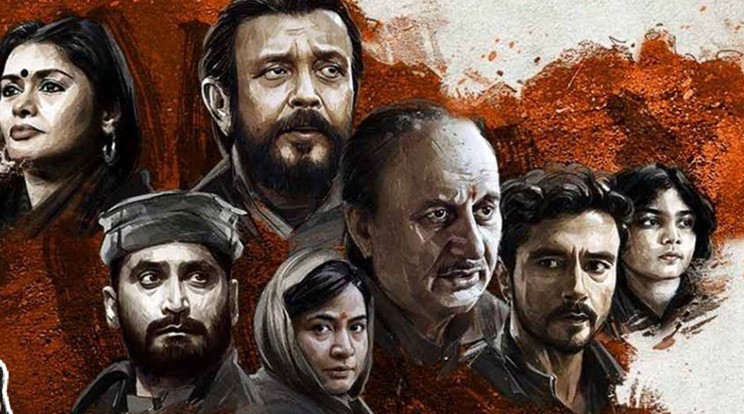Harmonious relationship between Muslims and Pandits in Kashmir has served as an inspiration for others, not only in India but the entire Sub continent.
Recently released, ‘The Kashmir Files’ is a movie written and directed by Vivek Agnihotri which tells the story of the sufferings endured by KPs in 1990 during the Kashmir insurgency.
By Farooq Wani
Kashmir is a beautiful region, rich in natural resources and boasts of an enlightened civilisation with unique cultural diversity that readily accepts an amalgamation of ideas, beliefs and thoughts. No wonder Kashmir is famous for its pluralistic culture, traditions, heritage and this is visible in the hospitality and bonhomie that has existed here for centuries. Harmonious relationship between Muslims and Pandits in Kashmir has served as an inspiration for others, not only in India but the entire Sub continent.
With the entry of the Kalashnikov in Kashmir in the late eighties, things changed and the very core of Kashmiri culture and values, often referred to as ‘Kashmiriyat’ took a massive hit. Kashmir, which was known for its peaceful environment and revered as a land where both Sufis and Rishis were worshipped with equal fervour, unfortunately turned into a killing ground and members of both the majority Muslim and minority Kashmiri Pandit (KP) communities were targeted.
Repeated threats and rampant killings of their community members forced KPs to leave Kashmir and this was a sad day for the land of Sufis and Rishis. The gun ended the centuries old inter-faith harmony that had ensured seamless merger of Kashmiri Muslims and pandits into a homogenous community with a common language, dress code, eating habits and a shared culture. While some say that the exodus of KPs was orchestrated by the then Governor late Jagmohan, others contend that no one would leave their homes and land unless the threat of being harmed if they stayed on wasn’t real and immense.
However, KPs weren’t the only ones who were targeted in Kashmir. Muslims were also murdered and the number of their dead is much higher than KPs. While most were killed on suspicion of working for security forces as informers, militants did not even spared separatist leaders like Abdul Gani Lone, Mirwaiz Molvi Farooq, Professor Adul Ahad Wani than HoD Law Deptt Kashmir University, VC Mushir ul Haq and his close aide Abudul Gani Zargar, Dr Ashie Farooq founder of Bone and Joint Hospital, Dr Abdul Ahad Guru and Communist leader Satar Ranjoor.
Recently released, ‘The Kashmir Files’ is a movie written and directed by Vivek Agnihotri which tells the story of the sufferings endured by KPs in 1990 during the Kashmir insurgency. The movie director has only focused on the trauma of KPs and this has become the center of controversy. Many feel that by doing so, this movie is inciting hatred against the Muslims. They also feel that by “unilaterally displaying half-truths and unsubstantiated fabrications,” the movie has damaged the close fraternal Muslim-KP bond in Kashmir.
Critics of the movie also complain that it provides no historical context and ignores the fact that hundreds of Muslims were also killed by the terrorists including the Lt Umar Fayaz, Police officer Ayaub Pandit and several sarpanchs. KPs weren’t the only victims of terrorism and so, the sacrifices of Muslims and Sikhs who were also targeted by the same gun should not be overlooked. While people may keep debating this issue, and keeping politics aside, the fact is that the exodus of KPs has been a huge loss for the people of Kashmir.
KPs were the backbone of the educational structure in Kashmir for centuries and due to their dedicated efforts, people from all communities were able to get sound education. The absence of KPs left a void in the field of education and though teachers from other communities have since filled the same, many say that there is a perceptible difference in the quality of teaching. In addition, with the trend of people and groups with vested interests setting school buildings ablaze becoming common, education in Kashmir continues to suffer.
The exodus of KPs has hurt the Kashmir cause as the international community, after carrying out detailed interaction with KPs living in refugee camps and its own discreet investigations, doesn’t believe that this sudden exodus was orchestrated by the Governor or the establishment. Conversely, they view it as ‘religious persecution’ being enforced through intimidation by Kashmiri armed groups. Separatist leader Dr GM Hubbi believes that exodus of KPs has only ended up giving the Kashmir movement a fundamentalist appearance and has thus earned New Delhi sympathy from the international community.
Politicking on ‘The Kashmir Files’ will serve no meaningful purpose and instead only create a communal divide. In recent times, KPs who have been visiting Kashmir to observe their religious rituals and worship at temples like Kheer Bhawani are being accorded a warm welcome by their Muslim brethren. This is certainly a positive development and a clear signal that Kashmiriyat isn’t dead after all.
Negative attempts to vitiate communal harmony and rip apart Kashmir’s social fabric needs to be challenged with full vigour. A conscious effort has to be made to change the negative perceptions that some segments harbour due to relentless propaganda by inimical forces. Sane voices need to take the initiative of building a progressive Kashmir.

